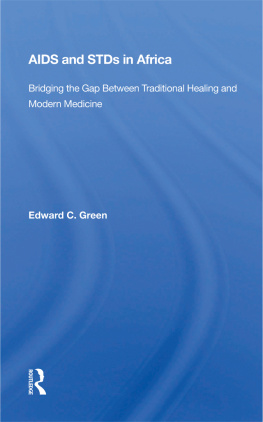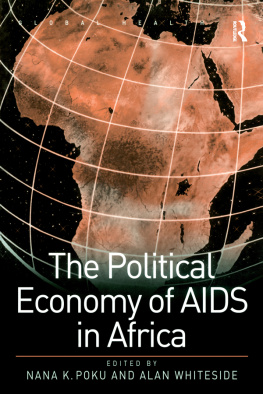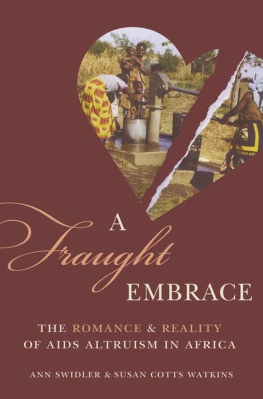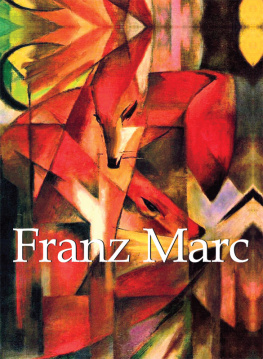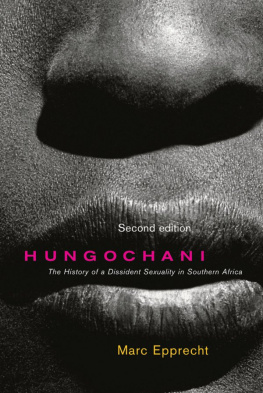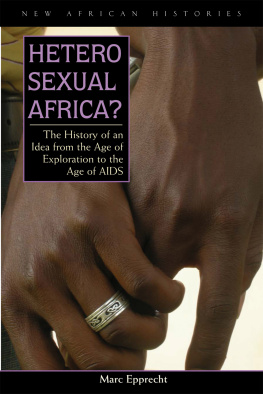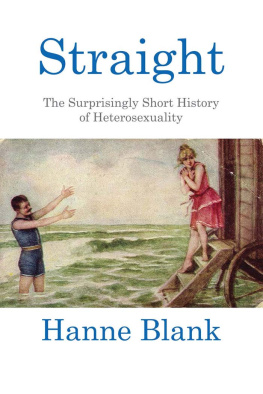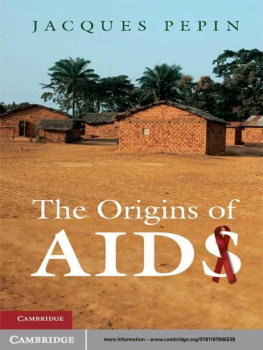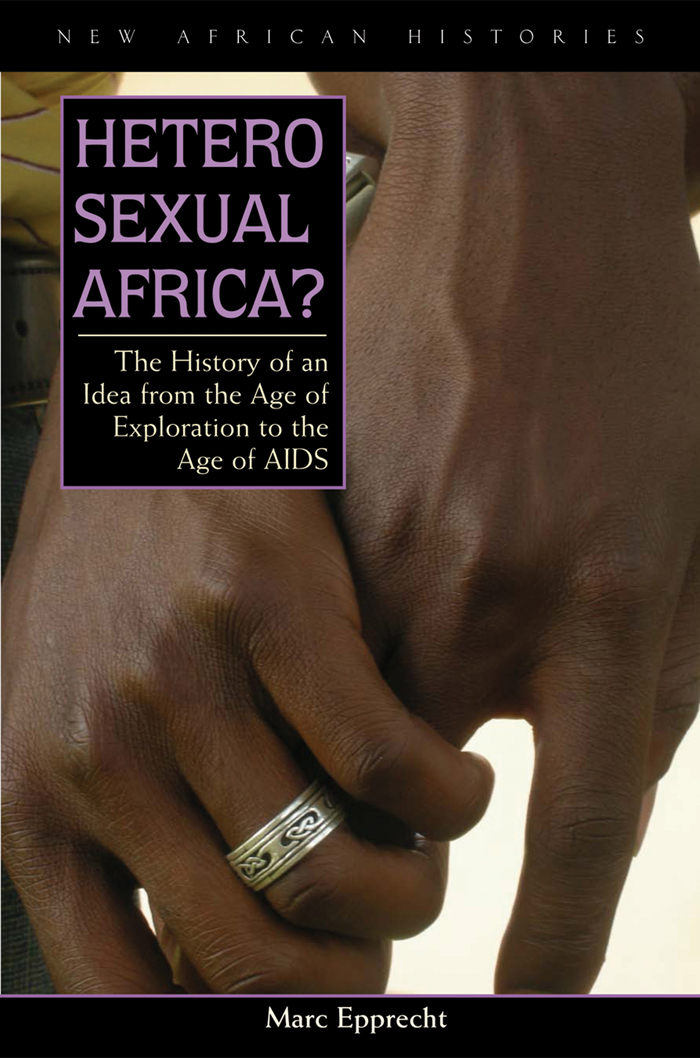Heterosexual Africa?
NEW AFRICAN HISTORIES SERIES

Series editors: Jean Allman and Allen Isaacman
David William Cohen and E. S. Atieno Odhiambo, The Risks of Knowledge: Investigations into the Death of the Hon. Minister John Robert Ouko in Kenya, 1990
Belinda Bozzoli, Theatres of Struggle and the End of Apartheid
Gary Kynoch, We Are Fighting the World: A History of Marashea Gangs in South Africa, 19471999
Stephanie Newell, The Forgers Tale: The Search for Odeziaku
Jacob A. Tropp, Natures of Colonial Change: Environmental Relations in the Making of the Transkei
Jan Bender Shetler, Imagining Serengeti: A History of Landscape Memory in Tanzania from Earliest Times to the Present
Cheikh Anta Babou, Fighting the Greater Jihad: Amadu Bamba and the Founding of the Muridiyya in Senegal, 18531913
Marc Epprecht, Heterosexual Africa? The History of an Idea from the Age of Exploration to the Age of AIDS
Heterosexual Africa?
The History of an Idea from the Age of
Exploration to the Age of AIDS

Marc Epprecht
OHIO UNIVERSITY PRESS
ATHENS

Ohio University Press, Athens, Ohio 45701
www.ohioswallow.com
2008 by Ohio University Press
All rights reserved
Published in 2008 in South Africa by
University of KwaZulu-Natal Press
Private Bag X01, Scottsville, 3209
South Africa
Email: books@ukzn.ac.za
www.ukznpress.co.za
University of KwaZulu-Natal Press ISBN 978-1-86914-157-8
To obtain permission to quote, reprint, or otherwise reproduce or distribute
material from Ohio University Press publications, please contact our rights
and permissions department at (740) 593-1154 or (740) 593-4536 (fax).
Printed in the United States of America
Ohio University Press books are printed on acid-free paper TM
15 14 13 12 11 10 09 08 5 4 3 2 1
Library of Congress Cataloging-in-Publication Data
Epprecht, Marc.
Heterosexual Africa? : the history of an idea from the age of exploration to the age of AIDS / Marc Epprecht.
p. cm.(New African histories series)
Includes bibliographical references and index.
ISBN-13: 978-0-8214-1798-0 (hc : alk. paper)
ISBN-13: 978-0-8214-1799-7 (pb : alk. paper)
1. HomosexualityAfricaHistory. 2. GaysAfricaHistory. 3. AfricaSocial life and customs. 4. AfricaPolitics and government. 5. AIDS (Disease)Africa. 6. HIV infectionsAfrica. I. Title.
HQ76.3.A356E64 2008
306.76'60967dc22
2008009908
To my friends and colleagues
Contents
Preface
For this book I owe deep gratitude to a broad range of colleagues and activists going back over many years in the struggle for sexual rights in Africa, Europe, and North America. I have already acknowledged the many who facilitated the original field and archival work for my previous book on this topic, Hungochani, research that continues to inform the present study. But I want to reiterate my appreciation to those in particular who got me thinking and acting on the project: Keith Goddard, Bev Clark, Brenda Burrell, Patricia McFadden, Wolfram Gleichmar-Hartmann, Jeff Piker, and Cary Alan Johnson. I also want acknowledge in general terms the guidance and inspiration I received from colleagues, activists, and sex workers at the AIDS in Context and the Sex and Secrecy conferences at the University of Witwatersrand (April 2001 and 2003, respectively), the PhD workshop on sexualities held at Roskilde University (May 2006) and the inaugural International Resource Network workshop in Dakar (February 2007). Any mistakes and misinterpretations that follow are of course entirely my own.
Financial and in-kind support came from Queens University, Kingston, Ontario. This included a modest research grant from the Advisory Research Council plus, more significantly, time off for research leave in South Africa. The latter was supported by the International Development and Research Centre (Ottawa) and my host institution, the University of KwaZulu-Natal, facilitated by Rob Fincham and Trevor Hill. My participation at the Dakar workshop was facilitated by Deborah P. Amory and Sybille Ngo Nyeck and was partially subsidized by the Ford Foundation.
Andrew P. Lyons first encouraged me to develop my scattered insights on the ethnography into a coherent article, toward which I greatly benefited from the suggestions of the anonymous reviewers, editor Winnie Lem, and Stephen O. Murray. assisted by sharing insights and sources from her doctoral research into the history of psychiatric care for blacks in South Africa. Antony Manion facilitated my search for documents pursuant to Louis Freed at the William Cullen Library and the Gay and Lesbian Archives, Johannesburg. Bodil Folke Frederiksen kindly shared her research on an important personal connection between psychiatry and Africanist ethnography.
, on HIV/AIDS, ventures into an especially sensitive area and as such I wanted to expose the ideas to as wide an audience as possible to garner reactions and suggestions. In chronological order, I received pointed feedback from Elaine Salo, Jane Bennett, Deborah Posel, Lisa Ann Richler, Signe Arnfred, Philippe Denis, Mai Palmberg, Taiwo Oloruntoba-Oju, and Charles Gueboguo. Open-ended public discussions were very helpful at the Center for African Studies at Rutgers University, the African Gender Institute at the University of Cape Town, the Department of History seminar series at the University of Zimbabwe, and Eleanor Preston-Whites graduate seminar in ethnography at the University of KwaZulu-Natal. Commentary at most of these venues tended to be relatively gentle. A lively audience at the Lesbian, Gay, Bisexual and Transgender Community Center in New York in November 2006, enabled by support from the International Gay and Lesbian Human Rights Commission, thus provided me a salutary baptism of fire. I also owe a big debt to students and tutorial assistants in my upper-year course at QueensAIDS, Power, and Povertyover the past few years, especially those from nursing and various other health science-oriented departments. Their essays and other contributions to the class pushed me toward a better and fairer understanding of the science of HIV/AIDS.
I did conduct a small number of key informant interviews. Special thanks go to Dr. Julie Dyer, formerly medical officer of health for Msunduzi Municipality, South Africa, who gave unsparingly of her recollections in an extended interview. Keith Goddard, Edwin Cameron, and Zackie Achmat shared their personal recollections of tensions within the gay rights and Treatment Action movements. Barbara Brakarsh and Margo Bedingfield shared insights on the production of their antihomophobia education kit, Auntie Stella. Edward Hooper and Wilson Carswell shared their recollections of life on the frontlines of the epidemic as it broke in Uganda in the mid-1980s.
I am grateful to Charles Gueboguo, Chris Dunton, and Erik Falk for their astute critical commentary on shared from his (then) forthcoming book on very closely related themes and analysis arising from cultural studies.


